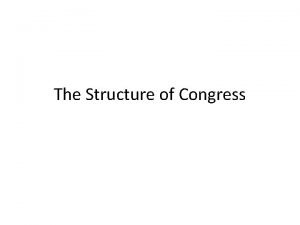Comparison Unites States Germany Our Leaders United States












- Slides: 12

Comparison Unites States Germany

Our Leaders United States Germany • President • Chancellor – – – Barak Obama Elected Term: 4 years May Serve 2 terms Background: Natural born, 35 years old and a resident of 14 years – – Angela Merkel Elected Term: 4 years Background: Must be able to vote in the Bundestag, age of 40

Lawmakers United States Germany • Legislative Branch

Government

• United States Bill of Rights Amendment I Congress shall make no law respecting an establishment of religion, or prohibiting the free exercise thereof; or abridging the freedom of speech, or of the press; or the right of the people peaceably to assemble, and to petition the Government for a redress of grievances. Amendment II A well regulated Militia, being necessary to the security of a free State, the right of the people to keep and bear Arms, shall not be infringed. Amendment III No Soldier shall, in time of peace be quartered in any house, without the consent of the Owner, nor in time of war, but in a manner to be prescribed by law. Amendment IV The right of the people to be secure in their persons, houses, papers, and effects, against unreasonable searches and seizures, shall not be violated, and no Warrants shall issue, but upon probable cause, supported by Oath or affirmation, and particularly describing the place to be searched, and the persons or things to be seized.

Bill Of Rights • • • • Us cont. Amendment V No person shall be held to answer for a capital, or otherwise infamous crime, unless on a presentment or indictment of a Grand Jury, except in cases arising in the land or naval forces, or in the Militia, when in actual service in time of War or public danger; nor shall any person be subject for the same offence to be twice put in jeopardy of life or limb; nor shall be compelled in any criminal case to be a witness against himself, nor be deprived of life, liberty, or property, without due process of law; nor shall private property be taken for public use, without just compensation. Amendment VI In all criminal prosecutions, the accused shall enjoy the right to a speedy and public trial, by an impartial jury of the State and district wherein the crime shall have been committed, which district shall have been previously ascertained by law, and to be informed of the nature and cause of the accusation; to be confronted with the witnesses against him; to have compulsory process for obtaining witnesses in his favor, and to have the Assistance of Counsel for his defence. Amendment VII In Suits at common law, where the value in controversy shall exceed twenty dollars, the right of trial by jury shall be preserved, and no fact tried by a jury, shall be otherwise re-examined in any Court of the United States, than according to the rules of the common law Amendment VIII Excessive bail shall not be required, nor excessive fines imposed, nor cruel and unusual punishments inflicted. Amendment IX The enumeration in the Constitution, of certain rights, shall not be construed to deny or disparage others retained by the people. Amendment X The powers not delegated to the United States by the Constitution, nor prohibited by it to the States, are reserved to the States respectively, or to the people.

Bill of Rights Germany • • • • • Article 1 (Protection of human dignity). 1. Human dignity shall be inviolable. To respect and protect it shall be the duty of all state authority. 2. The German people therefore acknowledge inviolable and inalienable human rights as the basis of every community, of peace and of justice in the world. 3. The following basic rights shall bind the legislature, the executive, and the judiciary as directly applicable law. Article 2 (Rights of liberty - personal freedoms). 1. Every person shall have the right to free development of his personality insofar as he does not violate the rights of others or offend against the constitutional order or the moral law. 2. Every person shall have the right to life and physical integrity. Freedom of the person shall be inviolable. These rights may be interfered with only pursuant to a law. Article 3 (Equality before the law). 1. All persons shall be equal before the law. 2. Men and women shall have equal rights. The state shall promote the actual implementation of equal rights for women and take steps to eliminate disadvantages that now exist. 3. No person shall be favored or disfavored because of sex, parentage, race, language, homeland origin, faith, or religious or political opinions. No person shall be disfavored because of disability. Article 4 (Freedom of faith, of conscience and of creed). 1. Freedom of faith and of conscience, and freedom to profess a religious or philosophical creed, shall be inviolable. 2. The undisturbed practice of religion shall be guaranteed. 3. No person shall be compelled against his conscience to render military service involving the use of arms. Details shall be regulated by a federal law. Article 5 (Freedom of expression). 1. Every person shall have the right freely to express and disseminate his opinions in speech, writing, and pictures and to inform himself without hindrance from generally accessible sources. Freedom of the press and freedom of reporting by means of broadcasts and films shall be guaranteed. There shall be no censorship. 2. These rights shall find their limits in the provisions of general laws, in provisions for the protection of young persons, and in the right to personal honor. 3. Art and scholarship, research, and teaching shall be free. The freedom of teaching shall not release any person from allegiance to the constitution.

Bill of Rights continued. • • • • Article 6 (Marriage and the family; children born outside of marriage). 1. Marriage and the family shall enjoy the special protection of the state. 2. The care and upbringing of children is the natural right of parents and a duty primarily incumbent upon them. The state shall watch over them in the performance of this duty. 3. Children may be separated from their families against the will of their parents or guardians only pursuant to a law, and only if the parents or guardians fail in their duties or the children are otherwise in danger of serious neglect. 4. Every mother shall be entitled to the protection and care of the community. 5. Children born outside of marriage shall be provided by legislation with the same opportunities for physical and mental development and for their position in society as are enjoyed by those born within marriage. Article 7 (School education). 1. The entire school system shall be under the supervision of the state. 2. Parents and guardians shall have the right to decide whether children shall receive religious instruction. 3. Religious instruction shall form part of the regular curriculum in state schools, with the exception of non-denominational schools. Without prejudice to the state’s right of supervision, religious instruction shall be given in accordance with the tenets of the religious community concerned. Teachers may not be obliged against their will to give religious instruction. 4. The right to establish private schools shall be guaranteed. Private schools that serve as alternatives to state schools shall require the approval of the State and shall be subject to the laws of the Länder. Such approval shall be given when private schools are not inferior to the state schools in terms of their educational aims, their facilities, or the professional training of their teaching staff, and when segregation of pupils according to the means of their parents will not be encouraged thereby. Approval shall be withheld if the economic and legal position of the teaching staff is not adequately assured. 5. A private elementary school shall be approved only if the educational authority finds that it serves a special pedagogical interest or if, on the application of parents or guardians, it is to be established as a denominational or interdenominational school or as a school based on a particular philosophy and no state elementary school of that type exists in the municipality. 6. Preparatory schools shall remain abolished. Article 8 (Freedom of assembly). 1. All Germans shall have the right to assemble peacefully and unarmed without prior notification or permission. 2. In the case of outdoor assemblies, this right may be restricted by or pursuant to a law.

More Bill of Rights • • • • • Article 7 (School education). 1. The entire school system shall be under the supervision of the state. 2. Parents and guardians shall have the right to decide whether children shall receive religious instruction. 3. Religious instruction shall form part of the regular curriculum in state schools, with the exception of non-denominational schools. Without prejudice to the state’s right of supervision, religious instruction shall be given in accordance with the tenets of the religious community concerned. Teachers may not be obliged against their will to give religious instruction. 4. The right to establish private schools shall be guaranteed. Private schools that serve as alternatives to state schools shall require the approval of the State and shall be subject to the laws of the Länder. Such approval shall be given when private schools are not inferior to the state schools in terms of their educational aims, their facilities, or the professional training of their teaching staff, and when segregation of pupils according to the means of their parents will not be encouraged thereby. Approval shall be withheld if the economic and legal position of the teaching staff is not adequately assured. 5. A private elementary school shall be approved only if the educational authority finds that it serves a special pedagogical interest or if, on the application of parents or guardians, it is to be established as a denominational or interdenominational school or as a school based on a particular philosophy and no state elementary school of that type exists in the municipality. 6. Preparatory schools shall remain abolished. Article 8 (Freedom of assembly). 1. All Germans shall have the right to assemble peacefully and unarmed without prior notification or permission. 2. In the case of outdoor assemblies, this right may be restricted by or pursuant to a law. Article 9 (Freedom of association). 1. All Germans shall have the right to form corporations and other associations. 2. Associations whose aims or activities contravene the criminal laws, or that are directed against the constitutional order or the concept of international understanding, shall be prohibited. 3. The right to form associations to safeguard and improve working and economic conditions shall be guaranteed to every individual and to every occupation or profession. Agreements that restrict or seek to impair this right shall be null and void; measures directed to this end shall be unlawful. Measures taken pursuant to Article 12 a, to paragraphs (2) and (3) of Article 35, to paragraph (4) of Article 87 a, or to Article 91 may not be directed against industrial disputes engaged in by associations within the meaning of the first sentence of this paragraph in order to safeguard and improve working and economic conditions. Article 10 (Privacy of correspondence, posts, and telecommunications). 1. he privacy of correspondence, posts and telecommunications shall be inviolable. 2. Restrictions may be ordered only pursuant to a law. If the restriction serves to protect the free democratic basic order or the existence or security of the Federation or of a Land, the law may provide that the person affected shall not be informed of the restriction and that recourse to the courts shall be replaced by a review of the case by agencies and auxiliary agencies appointed by the legislature.

Electoral System United States Germany • Democracy • Vote age 18 • Federal parliamentary republic • Vote age 18

Crime United States Germany • Crime Rate – Crimes per 1000 41. 29 – Prisoners 2. 02 million – Crime levels-ranke 30 th – Murder rate 65. 22 – – Crimes per 1000 Prisoners Crime levels-rank Murder rate 78. 89 74, 904 77 th 52. 2

Taxes and finance Germany US • Income tax? Yes • Military spending: 23 million • Income tax? Yes • Military spending: 640 billion • Education: 8 million • Healthcare: 84 million • Education: 67 billion • Healthcare: 800 billion
 Tableau de conversion tonne
Tableau de conversion tonne Les unités de la pression
Les unités de la pression Charlemagne unites germanic kingdoms
Charlemagne unites germanic kingdoms The upper epiphysis unites with the shaft
The upper epiphysis unites with the shaft Impulse units
Impulse units Compairson test
Compairson test Chapter 6 human geography of the united states
Chapter 6 human geography of the united states Midwestern region of the united states
Midwestern region of the united states United states jaycees
United states jaycees Why did the us invade cuba
Why did the us invade cuba Expansion of the united states of america 1607 to 1853 map
Expansion of the united states of america 1607 to 1853 map Growth of the united states to 1853
Growth of the united states to 1853 What are the two houses of the united states congress?
What are the two houses of the united states congress?























